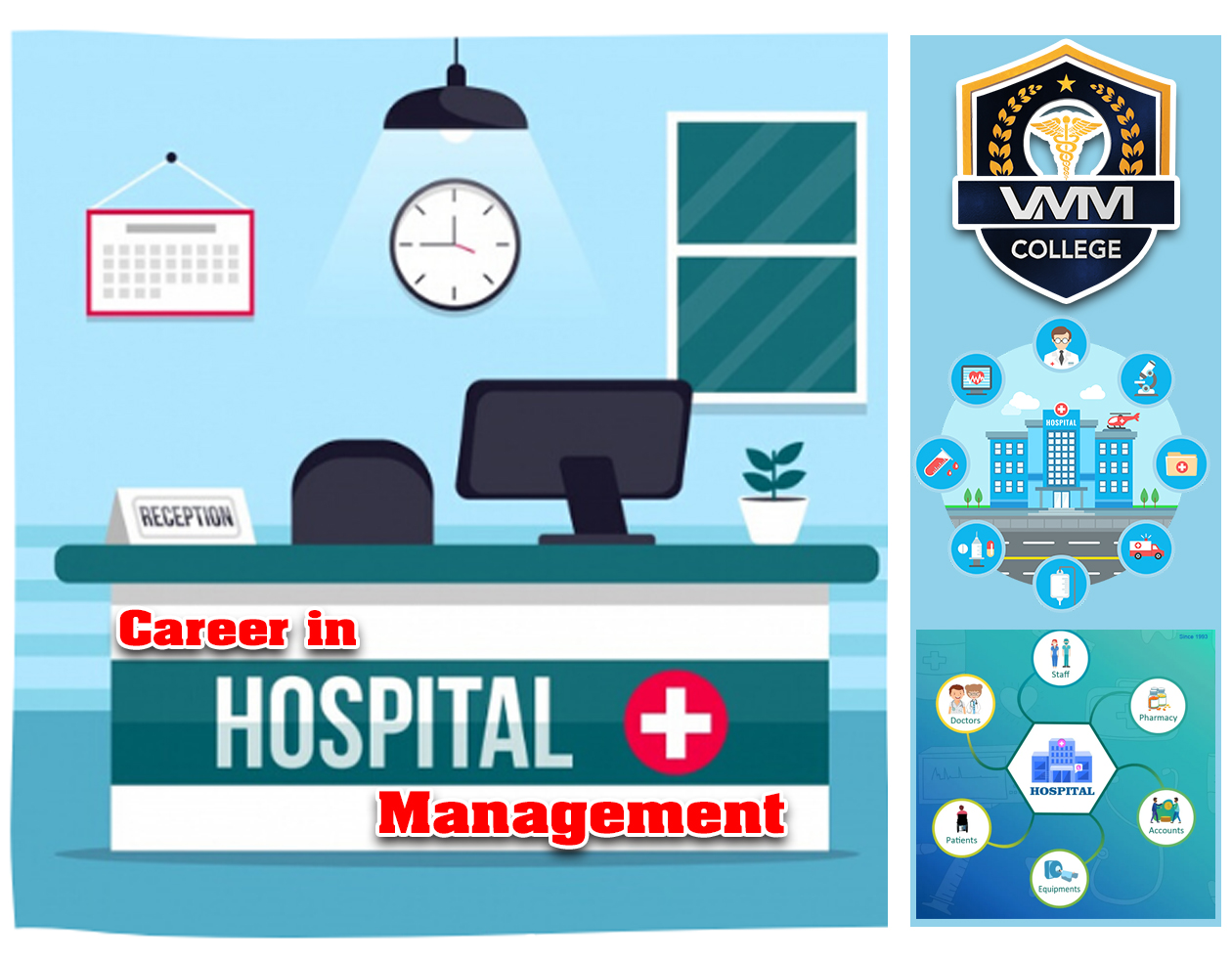What is Hospital Management? Career, Scope, Salary, Skills Needed

- In this article
The healthcare industry depends on the efforts of many different healthcare professionals. Of course, you have your doctors, nurses, and other healthcare workers, but that is not all. Hospitals, nursing homes, and other healthcare institutions also need people for administrative jobs.
A healthcare institution’s job is to ensure its patients receive the best care possible in every aspect. For that, they need administrative professionals who are ready to take on the challenge of managing hospitals and other healthcare facilities.
The healthcare industry’s CAGR for 2023-2027 is forecasted to be about 10.95%, while its projected market volume is $92.01 billion by 2027. With this growth rate, we can easily assume that the demand for hospital management professionals is soon to grow even more.
If you are considering becoming a hospital and healthcare management professional, now is a perfect time!
Let us take you through the details of hospital management, a career, its scope and various other aspects.
What is Hospital Management?
Hospital Management is a field comprising different healthcare professions at different levels, all working together to ensure the smooth running of healthcare facilities. Hospital management professionals are tasked with running the administrative operations of nursing homes, clinics, and hospitals. Their job includes staff management, administrative planning, accounting, public relations, etc. All with the goal of making sure that the patients receive the best care possible.
Hospital Management Career Scope
Hospital management is a vast field with lots of opportunities for everyone. People from medical and non-medical backgrounds can easily build a career in this field. With Bachelor’s, Master’s, or certification in hospital management, you can easily navigate lucrative career opportunities here.
Let’s take a look at some of the best career options professionals with a hospital management degree can pursue.
1. Healthcare Manager
A Healthcare Manager’s primary job role in a medical facility is supervising different medical services of the institution. Other spheres of their responsibilities may include coordinating different departments, ensuring smooth communication between healthcare professionals, and arranging schedules and budgets. Strategic planning, personnel training, and budgeting are a few of the most significant aspects of their jobs.
Average Annual Salary: INR 6.6 LPA
2. Clinical Manager
Clinics are outpatient facilities that extend work opportunities to individuals with a hospital management degree. The job of a Clinical Manager is to make sure that the clinic’s daily operations run efficiently. With excellent communication and organisational skills, a Clinical Manager helps officials hire new staff, communicate with professionals, and ensure patient care. A Clinical Manager can also become a Clinical Director with enough knowledge and experience under their belt.
Average Annual Salary: INR 9 LPA
3. Healthcare Human Resources Professional
Human Resources (HR) is a vital part of any industry. HR professionals are tasked with recruitment, employee relations, training, administration, and various other tasks essential to any organisation. In the healthcare field, they need acute knowledge of HR practices and the healthcare system.
Average Annual Salary: INR 8.0 LPA
4. Nursing Supervisor
Nursing supervisors are tasked with the job of overseeing and managing all the nursing staff at any healthcare facility. That includes handling all of their schedules, assigning patients, and ensuring that the nursing staff comply with the nursing standards while working.
Average Annual Salary: INR 4.2 LPA
Check out our free courses related to upskill yourself.
5. Health Information Manager
Information management is a crucial part of the healthcare field. With an abundance of data simultaneously being handled simultaneously, it is their job to ensure all the information is accurate, secure, and documented properly. Maintaining the integrity and security of data while also implementing guidelines and systems to improve the record-keeping process of the organisation is the main job of a health information manager.
Average Annual Salary: INR 10.0 LPA
Career opportunities in the healthcare domain are expanding massively, and with proper training and experience, you can be a part of this noble field!
Hospital Management Salary
Since the field of hospital operations management is so vast and nuanced, it is hard to pinpoint a salary in this field. Depending on your job role and experience, your annual salary in this field will vary. However, the average base salary of a Hospital Administrator in India is about INR 4,91,472 per annum. The more experience you gain in this field, the more your salary will increase.
How to Become a Hospital Operations Management Professional
The educational requirements, skills, and experience are all deciding factors when you want to get a job in hospital operations management. There are options for Bachelor’s and Master’s degrees, MBAs, and PG Diplomas that can help you become a trained healthcare professional. Some higher-ranking jobs also require the candidates to have a PhD in hospital administration to qualify for the position.
Here’s how you can navigate your path:
- Bachelor in Hospital Administration degree: A minimum of 50% marks in 10+2 from any state-recognised board is necessary for you to qualify for a BHA degree. Depending on the institution, you must also clear a CET test and personal interview to enrol in a college. The duration of this course is 3 years.
- Master of Hospital Administration Degree: A BHA degree with a minimum of 55% aggregate marks from a recognised university or a Bachelor’s degree in a Medical or science-related field with 55% marks is necessary to take admission in an MHA course. Depending on the university, you might also need to clear the CAT or TISS exams to take admission. The duration of this course is 2 years.
- MBA in Healthcare Management or Hospital Management: Along with a 50% mark in your Bachelor’s degree, you must also pass a CAT, XAT, or MAT exam to qualify for this course. The duration of an MBA course is 2 years.
- Post Graduate Diploma course in Health Management: A bachelor’s degree from any medical-related field is necessary for you to be admitted to a PG Diploma course in Health Management. These are usually professional courses that last for a year, so you will need some previous work experience in a field to qualify.
- PhD in Hospital Administration: A minimum of 55% marks in your MHA degree and five years of hands-on work experience are necessary for anyone to qualify for this degree. To be eligible, you must also pass the NET exams and personal interview rounds.
Hospital Management Skills
Relevant education is not the only thing you need to work in the hospital management field. The professionals working here need to have some key skills to survive in the field, as it requires them to be in contact with numerous people and handle difficult situations.
Here are some of the key skills you will need as a hospital and healthcare management professional:
- Teamwork
- Negotiation
- Communication
- Decision making
- Relationship building
- Analytical and logical skills
- Leadership
- Interpersonal skills
- Time management
- Research
- Problem-solving
It is a combination of education, soft skills, and experience that can ensure you a prospering career in hospital management.
Conclusion
The field of healthcare and hospital management is lucrative and full of opportunities. All you need is the right training to help you navigate this dynamic sphere. If you’re aiming to become a part of a healthcare professional.
Designed for professionals working in the field, this course can help you boost your career through live interactive classes and career assistance, to learn all the key skills like marketing, budgeting, planning, and providing quality care to patients in the course.
Related Posts

How To Choose Career: अपना करियर कैसे चुने
Vaidik Medical and Management College +91-9803010803 Contact us How To Choose Career: करियर चुनने में हो रही है दिक्कत? करियर

Hospital Management: अस्पताल प्रबंधन पाठ्यक्रम: स्वास्थ्य सेवा के क्षेत्र में एक सफल करियर की ओर कदम बढ़ाएं!
स्वास्थ्य सेवा क्षेत्र तेजी से बढ़ रहा है, और कुशल अस्पताल प्रबंधकों की मांग लगातार बढ़ रही है। अगर आप
